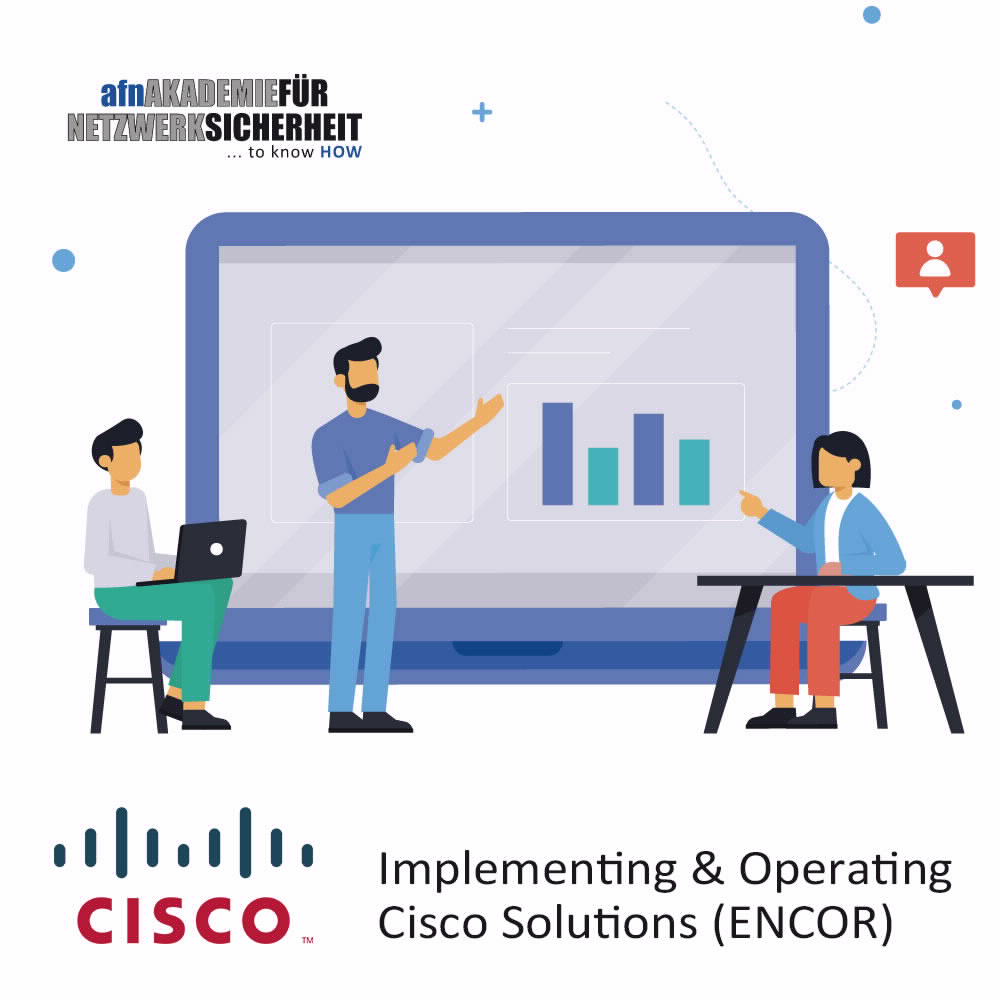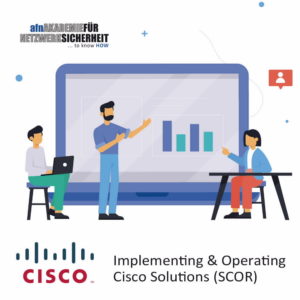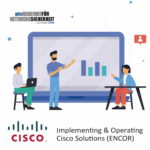Beschreibung
The Implementing and Operating Cisco Enterprise Network Core Technologies (ENCOR) v1.0 course gives you the knowledge and skills needed to configure, troubleshoot, and manage enterprise wired and wireless networks. You’ll also learn to implement security principles within an enterprise network and how to overlay network design by using solutions such as SD-Access and SD-WAN. Course content includes 3 days of self-study material.
This Enterprise Networking Core class consists of 5 days instructor led training and 3 days self study with 90 days lab access.
Zielgruppe
- Mid-level network engineers
- Network administrators
- Network support technicians
- Help desk technicians
Vorkenntnisse
- Implementation of Enterprise LAN networks
- Basic understanding of Enterprise routing and wireless connectivity
- Basic understanding of Python scripting
Lernziele
This course helps you prepare to take the 350-401 Implementing Cisco® Enterprise Network Core Technologies (ENCOR) exam, which is part of four new certifications:
- CCNP® Enterprise
- CCIE® Enterprise Infrastructure
- CCIE Enterprise Wireless
- Cisco Certified Specialist – Enterprise Core
Programminhalt
After taking this course, you are able to:
- Illustrate the hierarchical network design model and architecture using the access, distribution, and core layers
- Compare and contrast the various hardware and software switching mechanisms and operation, while defining the Ternary Content Addressable Memory (TCAM) and Content Addressable Memory (CAM), along with process switching, fast switching, and Cisco Express Forwarding concepts
- Troubleshoot Layer 2 connectivity using VLANs and trunking
- Implementation of redundant switched networks using Spanning Tree Protocol
- Troubleshooting link aggregation using Etherchannel
- Describe the features, metrics, and path selection concepts of Enhanced Interior Gateway Routing Protocol (EIGRP)
- Implementation and optimization of Open Shortest Path First (OSPF)v2 and OSPFv3, including adjacencies, packet types, and areas, summarization, and route filtering for IPv4 and IPv6
- Implementing External Border Gateway Protocol (EBGP) interdomain routing, path selection, and single and dual-homed networking
- Implementing network redundancy using protocols including Hot Standby Routing Protocol (HSRP) and Virtual Router Redundancy Protocol (VRRP)
- Implementing internet connectivity within Enterprise using static and dynamic Network Address Translation (NAT)
- Describe the virtualization technology of servers, switches, and the various network devices and components
- Implementing overlay technologies such as Virtual Routing and Forwarding (VRF), Generic Routing Encapsulation (GRE), VPN, and Location Identifier Separation Protocol (LISP)
- Describe the components and concepts of wireless networking including Radio Frequency (RF) and antenna characteristics, and define the specific wireless standards
- Describe the various wireless deployment models available, include autonomous Access Point (AP) deployments and cloud-based designs within the centralized Cisco Wireless LAN Controller (WLC) architecture
- Describe wireless roaming and location services
- Describe how APs communicate with WLCs to obtain software, configurations, and centralized management
- Configure and verify Extensible Authentication Protocol (EAP), WebAuth, and Pre-shared Key (PSK) wireless client authentication on a WLC
- Troubleshoot wireless client connectivity issues using various available tools
- Troubleshooting Enterprise networks using services such as Network Time Protocol (NTP), Simple Network Management Protocol (SNMP), Cisco Internetwork Operating System (Cisco IOS®) IP Service Level Agreements (SLAs), NetFlow, and Cisco IOS Embedded Event Manager
- Explain the use of available network analysis and troubleshooting tools, which include show and debug commands, as well as best practices in troubleshooting
- Configure secure administrative access for Cisco IOS devices using the Command-Line Interface (CLI) access, Role-Based Access Control (RBAC), Access Control List (ACL), and Secure Shell (SSH), and explore device hardening concepts to secure devices from less secure applications, such as Telnet and HTTP
- Implement scalable administration using Authentication, Authorization, and Accounting (AAA) and the local database, while exploring the features and benefits
- Describe the enterprise network security architecture, including the purpose and function of VPNs, content security, logging, endpoint security, personal firewalls, and other security features
- Explain the purpose, function, features, and workflow of Cisco DNA Center™ Assurance for Intent-Based Networking, for network visibility, proactive monitoring, and application experience
- Describe the components and features of the Cisco SD-Access solution, including the nodes, fabric control plane, and data plane, while illustrating the purpose and function of the Virtual Extensible LAN (VXLAN) gateways
- Define the components and features of Cisco SD-WAN solutions, including the orchestration plane, management plane, control plane, and data plane
- Describe the concepts, purpose, and features of multicast protocols, including Internet Group Management Protocol (IGMP) v2/v3, Protocol-Independent Multicast (PIM) dense mode/sparse mode, and rendezvous points
- Describe the concepts and features of Quality of Service (QoS), and describe the need within the enterprise network
- Explain basic Python components and conditionals with script writing and analysis
- Describe network programmability protocols such as Network Configuration Protocol (NETCONF) and RESTCONF
- Describe APIs in Cisco DNA Center and vManage
Kurssprache
Der Kurs wird in deutscher Sprache abgehalten.
Referenten
Unsere Trainer verfügen über langjährige Erfahrung im Bereich IT-Sicherheit, insbesondere zu Cisco. Sie werden regelmäßig als Trainer und Consultants vor Ort beim Kunden eingesetzt, so reichen ihre Kenntnisse um ein vielfaches über die Schulungsagenda hinaus. Sie kennen die Problematiken die im täglichen Betrieb auftreten können und somit nutzen sie die Möglichkeit diese Erfahrungen in unsere Schulungen und Workshops einfließen zu lassen.
Zeugnis
Sie erhalten eine Teilnahmebestätigung.
Zertifizierung
Optional: Zusätzlich können Sie die Prüfung 350-401 Implementing Cisco® Enterprise Network Core Technologies (ENCOR) (nicht Bestandteil des o.g. Preises) für 310,00€/netto ablegen. Sprechen Sie uns einfach an.




